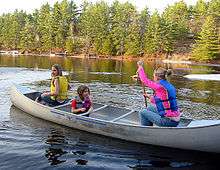canoe
English

People in a canoe.
Etymology
Adopted in 16th century from Spanish canoa, from Taíno *kanowa (“dugout canoe”) (compare Arawak kanoa (“canoe”), Wayuu anuwa, anua (“boat, canoe”)), from Proto-Arawak *kanawa.
Pronunciation
- enPR: kə-no͞o', IPA(key): /kəˈnuː/
Audio (US) (file) - Rhymes: -uː
Noun
canoe (plural canoes)
- A small long and narrow boat, propelled by one or more people (depending on the size of canoe), using single-bladed paddles. The paddlers face in the direction of travel, in either a seated position, or kneeling on the bottom of the boat. Canoes are open on top, and pointed at both ends.
- 1907, Robert William Chambers, chapter IX, in The Younger Set, New York, N.Y.: D. Appleton & Company, OCLC 24962326:
- He and Gerald usually challenged the rollers in a sponson canoe when Gerald was there for the weekend; or, when Lansing came down, the two took long swims seaward or cruised about in Gerald's dory, clad in their swimming-suits; and Selwyn's youth became renewed in a manner almost ridiculous, […].
-
- (slang) An oversize, usually older, luxury car.
Descendants
- → Irish: canú
Translations
small long and narrow boat
|
|
slang: an oversized luxury car
Verb
canoe (third-person singular simple present canoes, present participle canoeing, simple past and past participle canoed)
Translations
Derived terms
See also
Italian
This article is issued from
Wiktionary.
The text is licensed under Creative
Commons - Attribution - Sharealike.
Additional terms may apply for the media files.